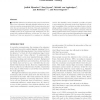Free Online Productivity Tools
i2Speak
i2Symbol
i2OCR
iTex2Img
iWeb2Print
iWeb2Shot
i2Type
iPdf2Split
iPdf2Merge
i2Bopomofo
i2Arabic
i2Style
i2Image
i2PDF
iLatex2Rtf
Sci2ools
JOCN
2011
2011
Reasoning with Exceptions: An Event-related Brain Potentials Study
■ Defeasible inferences are inferences that can be revised in the light of new information. Although defeasible inferences are pervasive in everyday communication, little is known about how and when they are processed by the brain. This study examined the electrophysiological signature of defeasible reasoning using a modified version of the suppression task. Participants were presented with conditional inferences (of the type “if p, then q; p, therefore q”) that were preceded by a congruent or a disabling context. The disabling context contained a possible exception or precondition that prevented people from drawing the conclusion. Acceptability of the conclusion was indeed lower in the disabling condition compared to the congruent condition. Further, we found a large sustained negativity at the conclusion of the disabling condition relative to the congruent condition, which started around 250 msec and was persistent throughout the entire epoch. Possible accounts for the observe...
| Added | 14 May 2011 |
| Updated | 14 May 2011 |
| Type | Journal |
| Year | 2011 |
| Where | JOCN |
| Authors | Judith Pijnacker, Bart Geurts, Michiel van Lambalgen, Jan K. Buitelaar, Peter Hagoort |
Comments (0)

